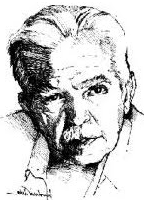
- Isto é um elefante?
My instant reaction was to say no, but one should never let themselves be carried away by their first impression. A quick glance thrown at the teacher was enough to realize she was very serious in her questioning, as she had that look of someone who introduces a difficult proposition. With that in mind, I searched the object in discussion more carefully.
There was no sign of a visible trunk, fact that could make a frivolous person quickly conclude that it was not such thing as an elephant. But even if we remove an elephant's trunk, it doesn't make it less of an elephant. Even if it dies after the ruthless surgery, it still is an elephant. Still is, for that a dead elephant is, in principle, as elephant as any other. Reflecting on it, I realized I should check if the thing had four legs, four thick legs, as usually elephants have. It didn't. Nor could I find the tiny tail featured by the large animal which is occasionally wagged with a childish grace, as I had noticed several times at the circus.
Having finished my observations, I turned to the teacher and said convincingly:
- Não, não é!
She gently sighed in relief and satisfaction. The delay of my answer had let her anxious. She immediately asked:
- Isto é um livro?
I laughed at the question. I've been living a fair share of my life amongst books. I know books. I deal with books. I'm capable of recognizing a book at the first sight surrounded by any sorts of objects, be they bottles, bricks or mature fruits - be they whatever they are. That thing was not a book, and even supposing that there were books wrapped in porcelain, that was not one of them. It didn't look like a book at all. My answer took - if much - two seconds:
- Não, não é!
I had the pleasure of seeing her satisfied again, but just for a few seconds. That woman was one of those insatiable spirits that are always proposing questions and that address the nature of things with a restless interest.
- Isto é uma faca de pão?
I got very disturbed with that question. To be honest, I didn't know what a faca de pão could be. Maybe it meant mortgage... Nah, not mortgage. Why would it mean mortgage? Faca de pão! That was undoubtedly an unpleasant word. Maybe it meant boss or wrist watch, and - very likely - migraine. Nevertheless, I courageously answered:
- Não, não é.
My words resounded loud and a bit violent as I felt disgusted by the idea of admiting that that or any other thing around me could be a faca de pão.
She then went back to her interrogation. This time though the question was preceded by a certain malicious look, a kind of insinuation, a distant touch of challenge. Her voice was gentler than in the other times. I'm not unaware of the psychology of women so even before she could open her mouth I already knew this would be a decisive word.
- Isto é um cinzeiro?
My heart was filled with happiness. First of all because I know what a cinzeiro is, a cinzeiro is an ashtray. Second of all because, by staring at the object she was showing me, I realized an extraordinary similarity with a cinzeiro. It was an egg-shaped porcelain object measuring approximately 13 centimeters in length.
The borders were about 1 centimeter tall and had a few round recesses - two or three of them - in the upper part. In the main depression, some sort of basin bound by these borders, there was a small piece of a smoked cigarrette (a butt) and, here and there, sparse ashes, besides a used match. I answered:
- Sim!
What happened next I could not describe with words. The fair lady had her face enlighted by a wave of happiness. Her eyes shone - Victory! Victory! And a wide smile quickly bloomed in her lips which shortly before were frown with restless and sad anxiety. She slightly leaned forward from her chair and could not help stretching her arm to pat me on my upper arm, while excitedly saying:
- Muito bem! Muito bem!
I'm a man of natural shyness, specially regarding to women. The efusiveness with which she celebrated my victory disturbed me. I felt scared, ashamed and very proud.
I left extremely satisfied with that first class and walked down the street taking firm steps. As I passed a cigar shop, I saw some english pipes through the glass and felt deeply tempted to buy one. Certainly I would have engaged a long conversartion with the Brazilian ambassador if I had met him at that moment. I would take the pipe off my mouth and say to him:
- Isto não é um cinzeiro!
And he would be highly pleased to see that I could speak portuguese, as it must always be agreeable to an ambassador to see his native language being versified by the good people of the country where he is located.
* Text translated and adapted from the work of Rubem Braga.


